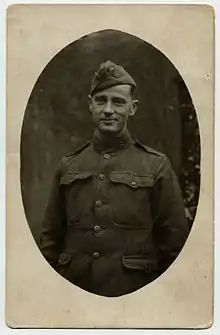Gerald Nugent
Gerald Paul Nugent, Sr. was the owner of the Philadelphia Phillies baseball team of the National League from 1931 through 1942.
Gerald P. Nugent | |
|---|---|
 | |
| Born | Gerald Paul Nugent October 25, 1892 |
| Died | November 1970 (aged 78) Philadelphia, Pennsylvania |
| Nationality | American |
| Occupation | Merchant |
| Known for | Owner of the Philadelphia Phillies, 1931 to 1942 |
| Spouse(s) | Mae Mallen (m. 1925) |
A leather goods and shoe merchant, Nugent married longtime Phillies secretary Mae Mallen in 1925. Longtime Phillies owner William Baker died in 1930, leaving half of his estate to Mallen and half to his wife. With the support of Baker's widow, Nugent became team president. Baker's widow died in 1932, leaving Nugent in full control.
Unlike Baker, Nugent cared more about winning than saving money. However, even with his income from his other businesses, he did not have the financial means to get the Phillies out of the National League basement. He was forced to trade what little talent the team had to make ends meet and had to use some creative financial methods to be able even to field a team at all.[1] The one highlight of his ownership was a 78–76 record in 1932, the only time that the Phillies finished with a winning record between 1918 and 1948.
One notable step Nugent took, in mid-season 1938, was to abandon Baker Bowl, the club's 52 year old home which had become severely run down.[2] The Phillies moved five blocks west to become tenants at Shibe Park, home of the Athletics.
Nugent finally reached the end of his rope in 1942. A year after posting a 43–111 record, the worst in franchise history, the Phillies needed an advance from the league just to be able to take part in spring training. Realizing that there was no way he could operate the team in 1943, he reached an agreement in principle that February to sell the team to Bill Veeck, who planned to bring in Negro league stars in an effort to turn the moribund franchise around. However, when Baseball Commissioner Kenesaw Mountain Landis, an intractable opponent of integration, got wind of it, he pressured National League President Ford Frick to quash the deal and take over the team. A week later, the league sold the Phillies to lumber broker William D. Cox.
This story was initially refuted by a 1998 article in the Society for American Baseball Research's The National Pastime, which argued that Philadelphia's black press made no mention of a sale to Veeck.[1] However, new evidence has surfaced that suggested Nugent did indeed plan to sell the Phillies to Veeck.[3][4]
References
- Jordan, David M.; Gerlach, Larry R.; Rossi, John P. "A Baseball Myth Exploded: Bill Veeck and the Sale of the 1943 Phillies" (PDF). sabr.org. Retrieved September 15, 2019.
- "Gerry Nugent Started as 'Grandstand Manager'; Now One Shrewdest Traders in Baseball World". Milwaukee Journal. July 11, 1940. p. 2 (Final). Retrieved September 15, 2019.
- Tygiel, Jules (2006). "Revisiting Bill Veeck and the 1943 Phillies" (PDF). Baseball Research Journal: 109. ISBN 1-933599-04-9. Retrieved May 12, 2012.
- Dickson, Paul (2012). Bill Veeck: Baseball's Greatest Maverick. New York, NY: Walker & Company. ISBN 978-0-8027-1778-8.